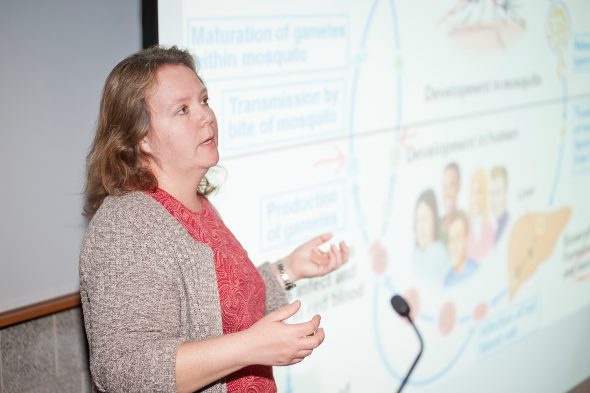Serving students while teaching about global pandemic through e-learning

As spring break was approaching and the COVID-19 pandemic had begun pushing classes online, Sandra Gibbons, a lecturer in biological sciences, took advantage of the additional time before spring break to prepare to teach remotely.
She and other faculty in biological sciences pooled their ideas to share best-teaching practices for e-learning. Working with UIC technology and instructional design specialists, the educators were able to develop a plan to move online.
Some faculty recorded lectures for students to watch at their convenience and held individual online office hours to answer questions that had come up from the video lessons. Some teachers held live interactive lectures that were recorded for students who had conflicts so they could view them at their leisure. Gibbons recorded lectures and held live conferences for questions. Others used a combination of live and pre-recorded classes.
The first thing that faculty had to determine was which students would be facing technology-access issues while off campus. The information was passed on to the College of Liberal Arts and Sciences, which was able to equip most with technology, Gibbons said.
“It was quite a wonderful thing to see how all of us came together to help each other out and our students,” Gibbons said.
As many teachers across the country struggle to keep their students’ attention, Gibbons did not have much trouble doing so. As a teacher of general microbiology, she and her students were living what they were learning.

“I did tell them at the start of the semester that the class would be applicable to their real lives, but I didn’t expect a global pandemic to help me make my point,” Gibbons said.
What helped a great deal was the availability of online conferencing systems. She used Blackboard Collaborate to interact with her students, while other teachers successfully used Zoom or Webex. She is planning to work with an instructional designer this summer who is well-versed in making sure online or remote courses are more accessible to people who have disabilities.
“I’ll take what I learn and help educate the rest of my department,” she said.
Other than the convenience of not having to battle traffic on the expressways, what Gibbons also liked about online teaching was having to be deliberate and reinvent one’s self as a teacher and face the challenges of this time.
“I love that it forces you to rethink how to best educate the students, as sometimes we can get a bit too comfortable in how we do things,” Gibbons said. “This can be a great time to improve what we do.”
She noted that the new reality also has helped put everyone on similar footings. She has noted that virtual experience helped some shy students “come out of their shell” and participate more in online discussions or virtual conferences, she said.
Many students, like Monica Thokkudubiyyapu, had to face the pandemic in the last semester of their senior year after having the on-campus experience for the years leading up to it. She missed studying in the library, going to classes, going to work research projects, volunteering and going to the recreation center with other students, she said.
“I didn’t know it was my last time seeing some individuals or sitting in lecture centers. At times, studying at home became stressful and the internet would be extremely slow,” said Thokkudubiyyapu, who graduated with a degree in disability and human development.
She admired and was encouraged by the dedication and patience that Gibbons and other professors showed to students.
In her microbiology class, Thokkudubiyyapu enjoyed how Gibbons conducted her courses through remote learning by using Blackboard as a platform to teach the content and that each lecture was already pre-recorded into Blackboard prior to normal class times.
“I loved this as I was able to watch these videos on repeat until I understood the content, especially when studying for the last exam,” she said. “During class times, it would be considered her office hours for all students, where any student was able to ask different questions on content or exams.”
In addition, another key component to her e-learning success was that Gibbons was very responsive on email and was very encouraging that she and others could do well in the course.
“I personally loved going to UIC, and I would recommend it to other people. I loved being surrounded in a culturally diverse environment of students and staff,” Thokkudubiyyapu said. “I also enjoyed being within the city, as I was able to experience city-life while continuing in my education. I have made some of my best memories at UIC.”
